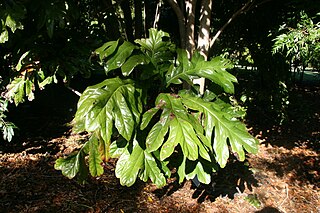
Athertonia is a monotypic genus of plants in the family Proteaceae. The sole described species is Athertonia diversifolia, commonly known as Atherton oak, athertonia, creamy silky oak or white oak. It is endemic to a small part of the Wet Tropics of Queensland, Australia. A relative of the macadamia, it has potential in horticulture and the bushfood industry.
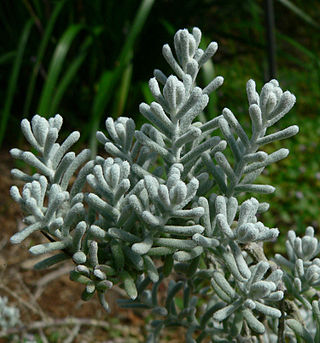
Maireana sedifolia, also known as the bluebush or pearl bluebrush is a compact shrub endemic to Australia, and found in New South Wales, Victoria, South Australia, Western Australia, and the Northern Territory. It is used in pasture and as a garden plant where it is popular due to its distinctive grey foliage.

Syzygium forte, commonly known as flaky-barked satinash, white apple or brown satinash, is a tree in the family Myrtaceae native to New Guinea and northern Australia.
Cyperus centralis is a sedge of the family Cyperaceae that is native to arid areas of central Australia.
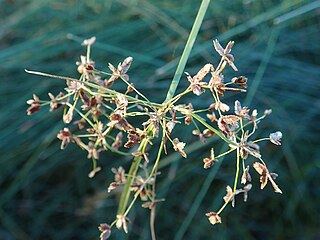
Cyperus concinnus is a sedge of the family Cyperaceae that is native to Australia, and found in New South Wales, Queensland, the Northern Territory, South Australia, Victoria and Western Australia.
Cyperus latzii is a sedge of the family Cyperaceae that is native to Australia, and found in the Northern Territory and Western Australia.

Maireana pyramidata is a species of plant within the genus, Maireana, in the family Amaranthaceae. It is endemic to Australia, and widespread throughout Australia in the inland, where it is found in Victoria, New South Wales, Queensland, the Northern Territory and Western Australia.
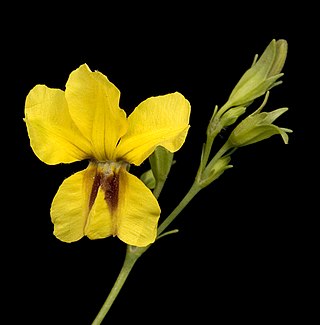
Velleia macrophylla, or large-leaved Velleia, is a perennial herb in the family Goodeniaceae, which is endemic to Western Australia. It grows on moist sites in Beard's South-west province. It flowers from October to December or January.
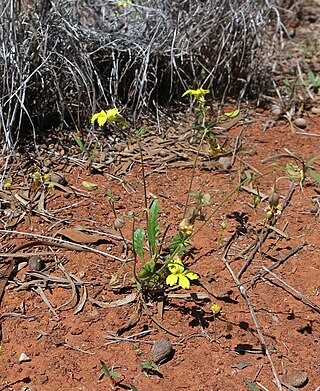
Velleia glabrata is an annual herb in the family Goodeniaceae, which is native to all mainland states and territories of Australia with the exception of Victoria. It grows on sand and clay, flowering from June to October.

Calandrinia corrigioloides is an annual herb in the family Montiaceae, and is native to Western Australia, South Australia, and Victoria.

Calandrinia granulifera is an annual herb in the family Montiaceae, and is native to New South Wales, Tasmania, Western Australia, South Australia, and Victoria.

Actinotus leucocephalus is a small plant in the Apiaceae family, endemic to Western Australia.

Paractaenum novae-hollandiae is a grass, native to Western Australia. It is an annual herb growing from 0.2 to 0.5 m high, on sands and loams. Its green-purple flowers may be seen from March to September.

Palaquium galactoxylum, commonly known as Cairns pencil cedar, Daintree maple or red silkwood, is a species of very large tree in the family Sapotaceae which is endemic to rainforests of New Guinea and northern Australia. It can produce spectacularly large buttress roots.
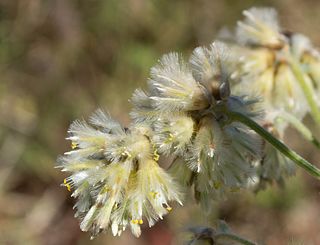
Ptilotus auriculifolius is an herb in the Amaranthaceae family.

Gardenia ovularis is a small tree in the family Rubiaceae. It is endemic to a very restricted part of north east Queensland, namely the coastal rainforests from the Bloomfield River southwards to Etty Bay, and with a further isolated occurrence at Mount Elliot, south of Townsville It was first described by Frederick Manson Bailey in 1893.

Trichanthodium skirrophorum is a plant species in the Asteraceae family (daisies), first described by Otto Wilhelm Sonder and Ferdinand von Mueller in 1853.

Triglochin calcitrapa is a species of flowering plant in the family Juncaginaceae, first described by William Jackson Hooker in 1848, and native to south-west Western Australia.

Schoenus nanus is a species of sedge endemic to Australia, and found in Western Australia, South Australia and Victoria. It was first described in 1844 by Christian Gottfried Daniel Nees von Esenbeck as Chaetospora nana, but in 1878 was transferred by George Bentham to the genus, Schoenus.

Hypserpa laurina is a slender twining climber in the plant family Menispermaceae. It is native to New Guinea and north eastern Queensland in Australia.


















